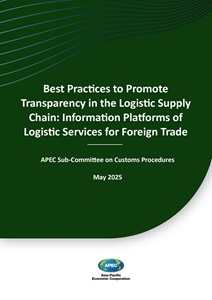
Proceedings
APEC Workshop on Promoting Decarbonization of Power Sector by Using Carbon-Free Energy (CFE)
The Asia-Pacific Economic Cooperation (APEC) is a regional economic forum established in 1989 to leverage the growing interdependence of the Asia-Pacific.
The Asia-Pacific Economic Cooperation (APEC) is a regional economic forum established in 1989 to leverage the growing interdependence of the Asia-Pacific.
APEC ensures that goods, services, investment and people move easily across borders. Members facilitate this trade through faster customs procedures at borders; more favorable business climates behind the border; and aligning regulations and standards across the region.
APEC ensures that goods, services, investment and people move easily across borders. Members facilitate this trade through faster customs procedures at borders; more favorable business climates behind the border; and aligning regulations and standards across the region.
APEC works to help all residents of the Asia-Pacific participate in the growing economy.
APEC works to help all residents of the Asia-Pacific participate in the growing economy.
Capacity building projects play an important role in helping translate APEC's goals into reality.
Capacity building projects play an important role in helping translate APEC's goals into reality.

Proceedings
•May 2025
Download Report
2MB
Published Under
Committee on Trade and Investment (CTI), Sub-Committee on Customs Procedures (SCCP)
Accessed
594
Pages
40
The final report, “Best Practices to Promote Transparency in the Logistic Supply Chain: Information Platforms of Logistic Services for Foreign Trade”, documents the results of a project organized by Peru’s Ministry of Foreign Trade and Tourism (MINCETUR) in collaboration with APEC economies, such as Hong Kong, China; Korea; and the United States, funded by the APEC Support Fund.
The project highlights the importance of transparency in the logistic supply chain for foreign trade, focusing on cost reduction, competitiveness improvement, and fostering trust among public and private stakeholders. It included a workshop held in Lima, Peru, on 17 August 2024, where best practices and innovative solutions were presented.
The report concludes with targeted policy recommendations focused on strengthening transparency in international trade logistics through collaborative governance at logistic nodes, adoption of interoperable digital technologies, regulatory clarity, stakeholder engagement, and regional data-sharing initiatives, highlighting the need for coordinated action to enable traceable, efficient, and trustworthy supply chains.

